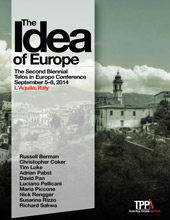 I thank very much the organizers for this opportunity to discuss “The Idea of Europe.” Among the several specific topics for discussion suggested in the conference outline, my paper will address the question: “Universalism or exceptionalism?” Now, in the context of this conference, this question might be understood either in historical-political or in philosophical terms, or somehow in both. And it is my contention that, in “the Idea of Europe” the historical-political and the philosophical as such substantially converge. In other words, in “the idea,” with its philosophical complexities, we should be able to find the trace of the decisive rupture in historical time—event, exception—that gave rise to modern Europe and conferred a particular direction, a primordial bias to its temporal unfolding; a bias not opposed to modern reason’s universalism, and inherently beyond the reach of its critical powers.
I thank very much the organizers for this opportunity to discuss “The Idea of Europe.” Among the several specific topics for discussion suggested in the conference outline, my paper will address the question: “Universalism or exceptionalism?” Now, in the context of this conference, this question might be understood either in historical-political or in philosophical terms, or somehow in both. And it is my contention that, in “the Idea of Europe” the historical-political and the philosophical as such substantially converge. In other words, in “the idea,” with its philosophical complexities, we should be able to find the trace of the decisive rupture in historical time—event, exception—that gave rise to modern Europe and conferred a particular direction, a primordial bias to its temporal unfolding; a bias not opposed to modern reason’s universalism, and inherently beyond the reach of its critical powers.
|
|
||||
|
Telos Press Publishing · PO Box 811 · Candor, NY 13743 · Phone: 212-228-6479 Privacy Policy · Data Protection Copyright © 2025 Telos Press Publishing · All Rights Reserved |
||||


